Swimming World’s Top Five Men’s Water Polo Events for 2018
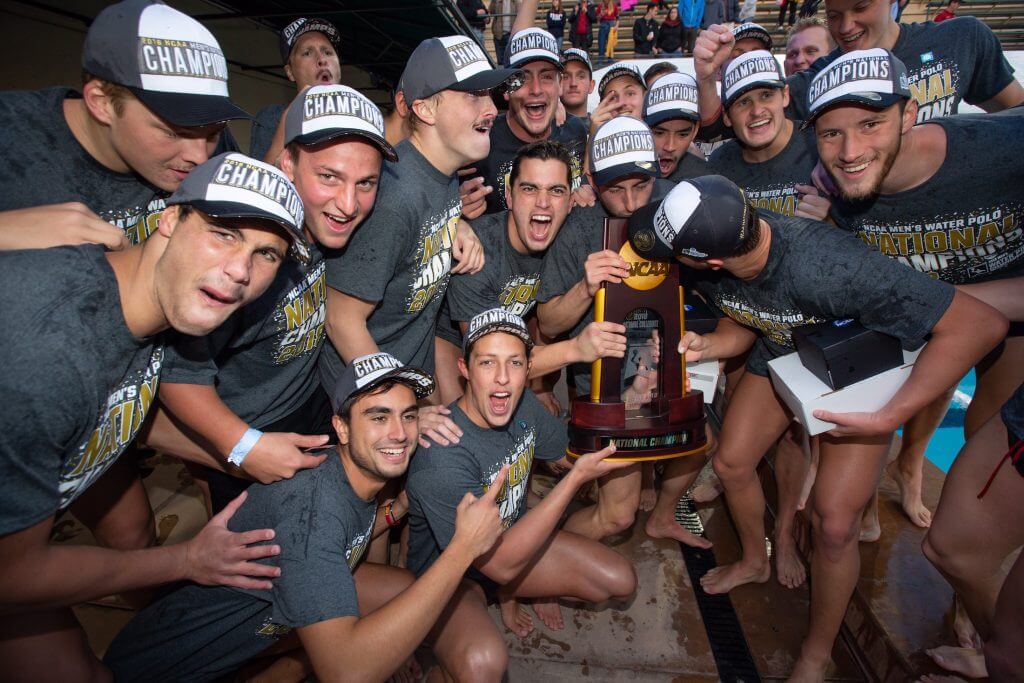
Editorial content for the 2021 Tokyo Olympic Games coverage is sponsored by GMX7.
See full event coverage. Follow GMX7 on Instagram at @GMX7training #gmx7

By Michael Randazzo, Swimming World Contributor
As the water polo community looks forward to a new year, Swimming World takes a look back at the top five events in men’s water polo for 2018.
The only major championship this season was the 33rd LEN European Water Polo Championships in Barcelona, won by the Serbian National Team. But, with qualifications for the 2020 Olympic Games in Tokyo kicking into high gear starting in 2019, there’s a lot to recall from the past year.
#5) Run up to the 2019 FINA World Championships in Gwangju, South Korea. Many different plot lines from 2018 will have implications for the 18th FINA World Championships. The most exciting development is the inclusion of a men’s water polo team from Germany for the first time since 2013. The Teutons qualified on their own soil when they finished fourth at the 2018 FINA Men’s Water Polo World Cup last September in Berlin. Not only was this a significant athletic victory for the Germans, but it helped the German Swimming Federation, which oversees the national team, secure substantial funding to take the next step forward towards rebuilding polo in Germany.
[Catching Up with Rainer Hoppe, Chairman of German Water Polo]
The Worlds will answer many questions about how the competition shapes up for Tokyo; one critical question is which Hungarian team will show up? There was the squad that finished an embarrassing eighth at the European Championships, losing to to Serbia, Montenegro and Russia. This was the same team that less than two months later not only sprinted to a title at the World Cup in Berlin, but toppled mighty Serbia in the semis; one of the few times in the last decade that the Hungarians beat their Serbian antagonists.
[Despite Rules Revolution in Water Polo, One Constant Remains: Hungary Wins!]
Equally important: just how good are the Australians? When the Aussies faced off against the Hungarians in the FINA World Cup final in Berlin, it was the first time they had ever appeared in a FINA final, and their silver medal was a first for the team from Down Under in 35 years. With Olympians Richard Campbell, George Ford, Joe Kayes and Aaron Younger playing professionally in Europe, the Sharks are a good bet to perform well in South Korea, which may set Elvis Fatovic’s team up for a run to the medal round in Tokyo.
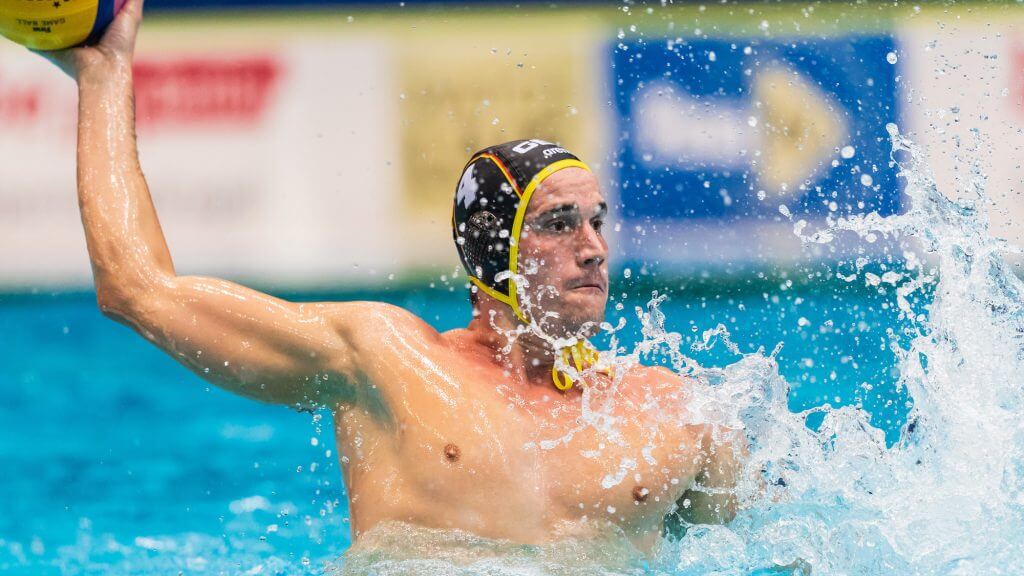
Germany’s captain, Julian Real. Photo Courtesy: Sportphoto.shop
Of course, there’s also the young Americans. They still need to qualify for Worlds; this is likely to occur next month at a Union Americana De Natacion (UANA) tournament hosted by Brazil. Team USA endured an up and down year; in April, the Yanks went to New Zealand and bested regional rivals Japan and Australia, then in June they beat European powers Spain and Croatia before dropping a gut-wrenching 11-10 decision to Japan. September saw the Americans back in Europe for the World Cup, where they beat the Japanese but still finished a pedestrian sixth. It’s becoming hard to predict which U.S. squad will show up in 2019, which is not only a World Championship year but is when Head Coach Dejan Udovicic’s squad hopes to qualify for Tokyo.
#4) Year of the Japanese? Much has been written about the relative change in fortunes for the Japanese men. After qualifying for the 2016 Rio Games—the first time in 32 years that a polo team from Japan had appeared in the Olympics—there continue to be concrete signs of progress. Most notable are two signature wins the past two years over the Americans; a stunning 15-7 drubbing in the 2017 World Championships that led to 10th place finish, Japan’s best-ever; and an 11-10 win in FINA World League play last summer. That produced a fourth place finish for the Japanese, their best international result since a similar finish at the 1932 Olympic Games.
[On The Record With Yoji Omoto, Head Coach for the Japanese Men’s Water Polo Team]
These successes featured what Head Coach Yoji Omoto has instituted as essential if his team is to succeed against larger, stronger opponents: opportunistic defense, murderous counter attacks and a motion offense that takes advantage of his team’s strong swim skills and fitness.
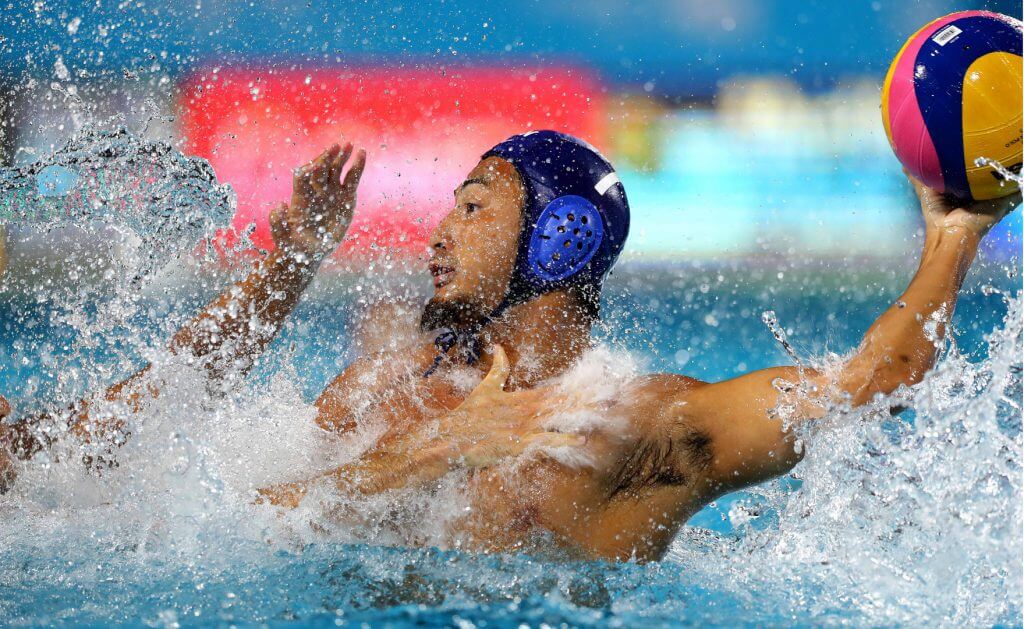
Japan’s Yusuke Shimizu. Photo Courtesy: FINA
2018 was not entirely a banner year for Omoto’s team, as the only major win the Japanese scored was over the Americans. Instead, they were left to contemplate significant “What ifs”: a 12- 7 loss to Serbia in which they broke out to a 3-2 first quarter lead, and a narrow 11-9 loss to Hungary in the World League Super Final.
Assured a berth in their own Games in 2020, what remains to be seen is if the Japanese revival will result in a trip to the Olympic medal round for the first time in decades.
#3) Serbia remains the team to beat. After a monumental upset in 2017, when Croatia snatched the world championship mantle from their arch-rivals with a thrilling 12-11 semifinal win, 2018 saw a restoration of the Serbians to the top of the water polo heap, albeit with some bumps and bruises along the way. Dejan Savic’s team came out on top when it mattered most, winning the European Championship for the fourth straight time, and—most importantly—vanquishing the Croatians 9-7 on their way to an unblemished tournament run.
With the core of the “Golden Age” group intact—only Zivko Gocic and Slobodan Nikic have retired from the team that has enjoyed one of the most successful runs in the illustrious history of Serbian, and before it, Yugoslavian polo—staying together for one final Olympic run has become paramount.
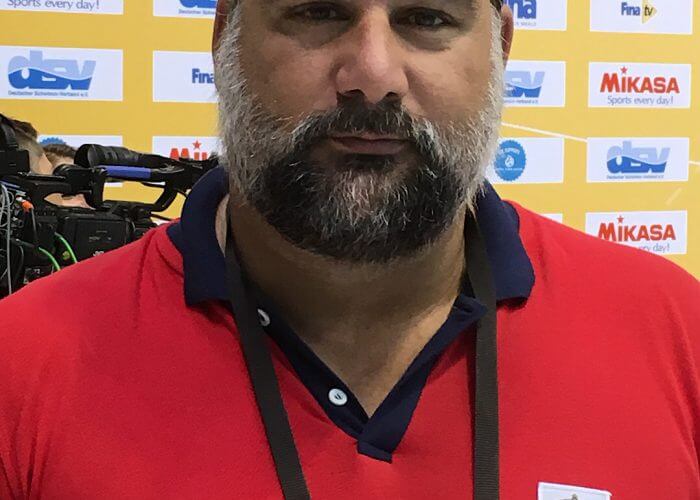
Serbia’s Dejan Savic. Photo Courtesy: Matthias Beckonert / www.wasserballecke.de
That Savic has been able to keep his aging roster committed to playing at a world-class level is a testament to the bonds he has established with his players over the years. And, it would be unwise to ever bet against the Serbs, though their recent third-place finish in the FINA World Cup, one of the few times in the last decade they haven’t advanced to a tournament final, raises questions regarding the ability of how much success can be expected from a group whose core contributors are all 30 or older.
With a year and a half to go before the Olympics, time will not be on the Serbians’ side. But Filip Filipovic is.
#2) USC wins the 2018 NCAA Men’s Water Polo Tournament. In a year which saw the return of Stanford to NCAA tournament play for the first time in four years, it was the Trojans who returned to the top of the heap in American men’s varsity water polo. A brilliant 28-1 regular season record was almost wrecked in the Mountain Pacific Sports Federation postseason tournament, as Jovan Vavic’s squad inexplicable lost twice and were almost excluded by the NCAA selection committee.
[Fast Start, Tense Finish to 2018 Men’s Water Polo Championship Gives USC 10th NCAA Title]
That would have been a grave mistake, and USC affirmed the selection committee’s decision. The Trojans took a scintillating semifinal match against arch-rival UCLA when Sam Slobodien beat the Bruin’s Alex Wolf with five seconds remaining, giving his team an 8-7 win and sending them to their 14th straight NCAA title match.
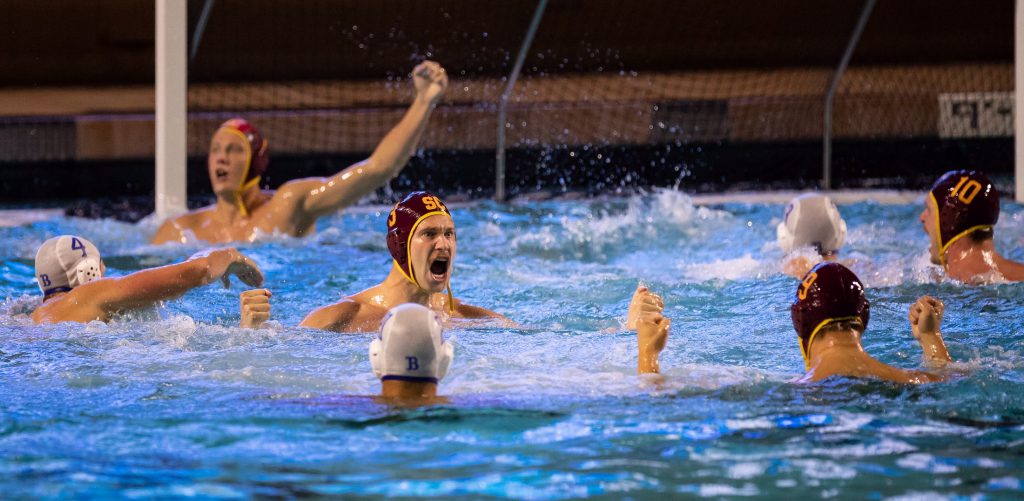
Trojan joy is two-fold: an NCAA semifinal win over the hated Bruins. Photo Courtesy: Catharyn Hayne
Propelled by the momentum of their big win—and by newcomer Jacob Mercep—Southern Cal burst out to a 6-0 lead over Stanford in the final before holding off a determined Cardinal rally to take a 14-12 win, the 10th men’s title in Vavic’s two decades coaching USC. Mercep, who led the team with 62 goals, registered five scores to capture the final’s MVP honors, while Hannes Daube, a freshman, contributed three scores and demonstrated that USC depth will be difficult to overcome in 2019.
#1) FINA approves new and amended rules for international play starting in 2019. The most closely watched story in polo was not in the pool but rather in the conference room. Last May, FINA’s Technical Water Polo Committee, in conjunction with the World Water Polo Coaches Association and others, proposed a series of rule changes to polo, in an effort to reform the game in advance of the 2020 Olympics. Two weeks ago, at an Extraordinary Congress held in Hangzhou, China, FINA approved these new rules, which will take effect beginning at the Europa Cup Finals, to be held April 5 – 7, 2019.
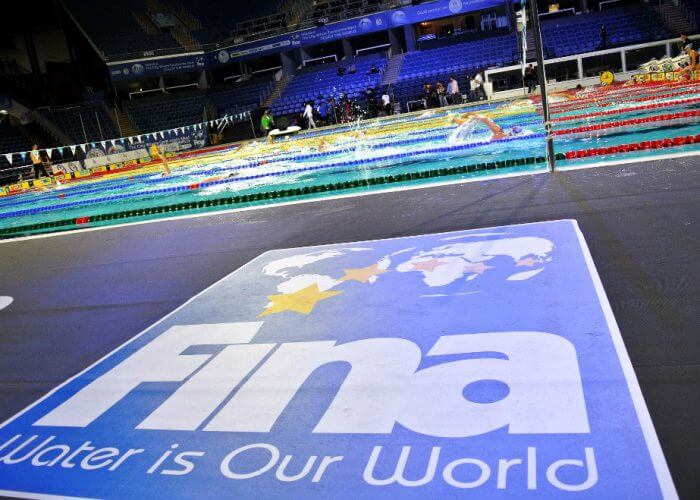
Photo Courtesy: M. Lapham
Even though many observers believe that these changes, meant to speed up play and make it less physical, are not as drastic as might have been imposed on the sport, the 18 new or revised rules approved in Hangzhou represent a moment of irreversible change for the oldest team sport on the Olympic program.
Internationally, the sport has struggled with financial problems and popularity, despite notable success at the recent European championships in Barcelona and Belgrade, and the 2017 World Championships in Budapest. There has been much confusion as to how the new rules will mesh with on-going competitions for LEN and other professional leagues, and the drastic roster reduction for Olympic play—from 13 to 11 players—has drawn mostly negative reaction.
[On The Record with FINA’s Andrey Kryukov; Water Polo’s Future Rests on Him]
Professional athletes, coaches and national team organizers have little choice but to follow the dictates of one of the world’s most powerful sports federations; the hope is that these new rule changes are not only smoothly integrated but that they create a more compelling product for polo watchers.
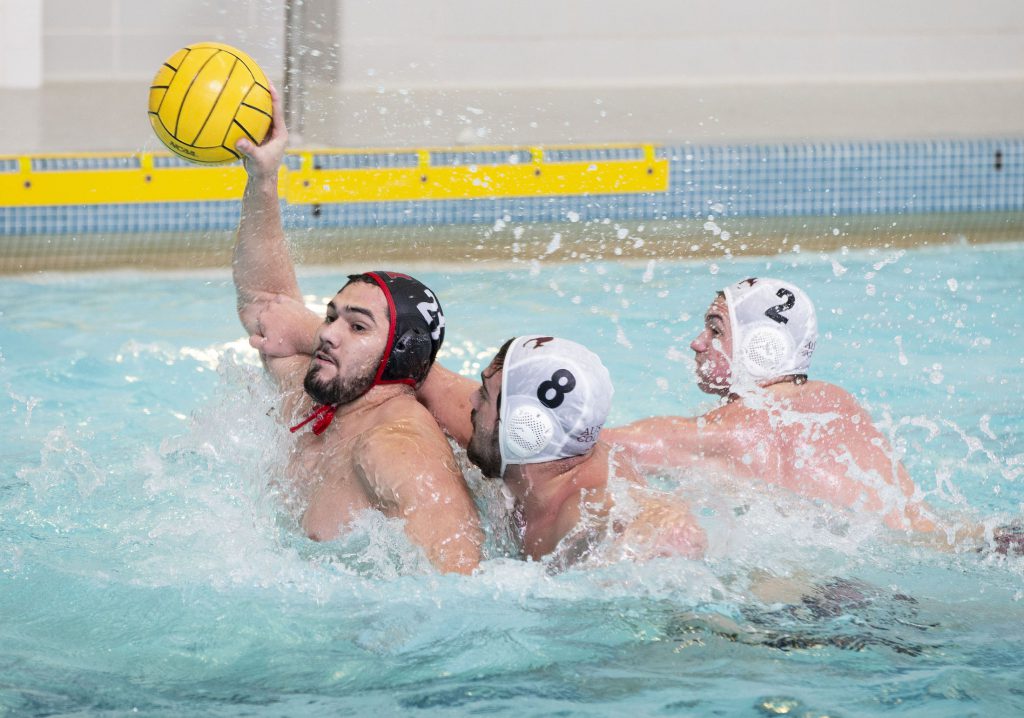
Monmouth’s Jesus Aguirre defended by Austin’s Alex Rodriguez (8) and Andrew Pope (2). Photo Courtesy: Greg Bartram
Honorable Mention: A new men’s program arrives at Austin College in Texas. As if to counter the cloud of uncertainty that threatens to invade from Europe, a striking development in the heart of America provides glimmers of hope for polo. This fall, Austin College, an NCAA Division III school 60 miles from Dallas, played its first-ever season of NCAA varsity play. While the results may not have been encouraging—one win and 15 losses—the development represents a tremendous opportunity in America.
[Austin College Men’s Water Polo: New Kid in Town Is Now a Winner]
Outside of California, the North Texas region may represent the most world’s most fertile region for the sports growth. Having a varsity college program with opportunity for Texas players to compete—21 of the 23 players on Head Coach Mark Lawrence’s roster are from the state—is an encouraging opportunity to see the sport prosper, even if the Kangaroos’ closest opponent, McKendree of New Lebanon, IL, is 600 miles away.




